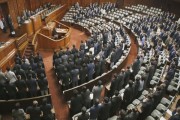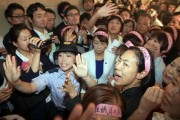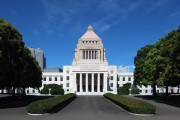There were scenes of protest at the Diet today as Abe Shinzo and the coalition of ruling parties led by the LDP effectively forced a bill on the current security treaty through to a vote.
The bill is surrounded by controversy since if it becomes law it would allow Japan the right to collective self-defense and significantly alter the current military framework. Given the nature of these changes, many citizens feel uneasy over the passing of the bill, while even the PM himself admits that most people probably don’t fully understand what these changes will entail.
The opposition parties, who oppose the changes, held placards during the meeting and have vowed to walk out of the plenary session scheduled for tomorrow.
Yahoo! netizens focus heavily on the walk-out of the opposition parties, pointing out that if they truly oppose something, then abstaining from the vote is not the answer — in a democratic society they should vote against it instead.
From Mainichi Shimbun:
[Bill Relating To U.S.-Japan Security Treaty] Bill To Be Brought To Vote During Lower House Plenary Session On July 16, 5 Opposition Parties Vow To Stage Walk Out
On July 15, at a meeting of the Lower House Special Committee on Peace and Security Legislation, the ruling parties forced through a motion on the bill relating to the U.S.-Japan Security Treaty. Therefore, it was decided on authority of the chairman Hayashi Motoo (LDP) that the board of the Lower House Committee on Rules and Administration would hold a plenary session on July 16, put the bill to a vote. The opposition parties plan not to walk out of the plenary session vote; however, it is assumed that the ruling parties will once again force the motion through, and the bill will be passed and sent to the Upper House.
If the bill is enacted, then as well as opening up a path for the enactment of the right to collective self-defense that previous cabinets were unable to assert, it would also mean that logistical support for foreign military and UN Peace-Keeping Operations (PKO) would be greatly expanded. Still, some constitutional law scholars are calling the move “unconstitutional”, while several public opinion polls have been comprised of high-numbers of answers stating that the explanation of what the bill entails is “insufficient”. Therefore the position of the government/ruling party as they try to hurry the bill through will be questioned in the Upper House.
Following the successful vote, PM Abe Shinzo stated that “Deliberations on the bill will continue in the Diet. I want to go on to explain things carefully to the Japanese people, so that the bill is easy to understand. Even within the LDP, we will redouble efforts so that each member of the Diet will explain things to their constituencies”. The Prime Minister gave this response to a question during a press conference at the Prime Minister’s Residence.
In response to a previous question during the closing remarks of the meeting of the special committee, the Prime Minister demonstrated his recognition of the fact that the Japanese people did not fully understand the bill. However, he also stated that “Perhaps the 1960 revision to the U.S.-Japan Security Treaty did not go through because the people did not understand it. The Peace-Keeping Operations Co-Operation Act (1992) was the same too, but due to our accomplishments since then we have been able to gain the support and understanding of the people”. In this way, the PM showed that he was adamant that the bill would be adopted at the next meeting of the Diet.
Today’s vote took place amidst resistance from members of the opposing parties, who held placards with slogans such as “Against Forcing Through Votes” written on them as they encircled committee chairman Hamada Yasukazu.
Following the vote, the five opposition parties — Democratic Party Japan, the Japan Innovation Party, the Japan Communist Party, the Social Democrats, and the People’s Life Party — held party-leader talks in the Diet, and agreed that they would not attend the vote on the government bill to be held in the plenary session on July 16, stating that “We sit out the vote as a means of opposing it”. Okada Katsuya of the Democratic Party Japan insisted that “The fact that the opposition parties are unanimous in not attending the vote is extremely meaningful”. Matsuno Yorihisa, of the Japan Innovation Party, criticized the response of the ruling parties, saying that “This is an unthinkably reckless move. It will be difficult to forgive the fact that the ruling parties just shot down the opposition of the Innovation Party and forced the bill through to a vote”.
Through the bill, the Armed Attacked Situation Law would be reformed, such that the right to collective self-defense could be enacted during a crisis situation that threatened the existence of Japan and which would usurp the rights of the Japanese people. As for logistical support for the militia of other nations, the bill would allow for revision of the current Act Concerning the Measures for Peace and Safety of Japan in Situations in Areas Surrounding Japan and make it into the Act Concerning the Measures for Peace and Safety of Japan in Situations With Significant Effects, and would also permit the supply of support an ammunition to foreign militia other than the United States military. In a situation whereby international peace was threatened, the bill would newly establish an International Peace Support Act in which the Japanese military could be dispatched rapidly.
These activities would abolish the existing framework in which dispatch of troops is limited to “non-conflict zones”. It would also revise the law so that there would be the flexibility to dispatch troops to places where there was no fighting at the time the troops were dispatched.
Pictures from 2ch.net:
Comments from Yahoo! Japan:
bzh*****:
The bastards that don’t even show up don’t have a say.
boo*****:
Ummm, the DPJ also forced through a vote, didn’t they?
uim*****:
By not attending they’re just basically throwing a tantrum, huh?
saeko:
If they don’t want to show up for the vote, fine, but please dock their salaries for the equivalent amount.
*************:
China and Korea are against this. Other countries in the region welcome it.
That’s basically it.
I wish they’d stop debating this by entangling it with issues from WWII.
nek*****:
Walk out…no-show…
They’re not even doing their jobs as Diet Members any more.
All they’re doing is running away from the things they don’t want to deal with.
Diet members need to be able to do their job even in situations like this.
kun*****:Doesn’t this count as abandonment of office?
kto*****:
If they attend but they don’t vote against it, then that’s the same as agreeing to it. I thought that the Communists would attend the vote and oppose it or something, but this is extraordinary.
okk*****:
It’s wrong to walk out!
who*****:
The Democrats have ended up thinking that opposing things is the right thing to do, haven’t they…
his*****:
I saw on the news that Tsujimoto Kiyomi was glancing up at the camera…just what you’d expect from a criminal.
ruriruri:
Numbers of votes forced through by Prime Ministers:
Hatoyama: in power for 266 days, 9 votes.
Kan Naoto: in power for 452 days, 8 votes.
Noda: in power for 482 days, 4 votes.
Abe: in power for 1200 days, 1 vote.
These people must be foolz w.asa*****:
It’s so weird that people think that just if this bill passes it will be OK to go to war.
gen*****:
If they walk out, then what is getting forced through, exactly?
If they oppose something, they should vote against it.
This is a democratic country. The DPJ, the SDP and the JCP are violent revolutionary parties.
And even the Innovation Party, since Matsuno came to power, have started siding with the democrats.
I wish Hashimoto would reform the party again.
Please do your best so that you don’t get cast out by the people, like in Hana Moyu.*****:
Isn’t it just pure populism to kick up a fuss with placards like that?
kan*****:
The logic is that you should hand in your notice before you walk out.
edl*****:
In the world of politics, if you walk out you lose.












